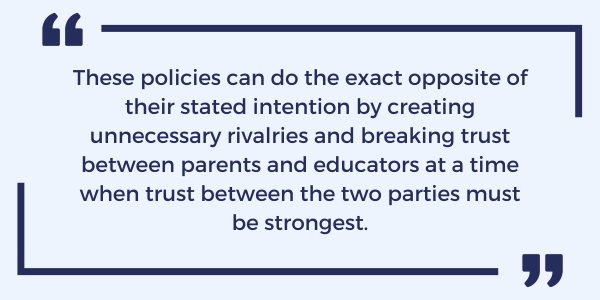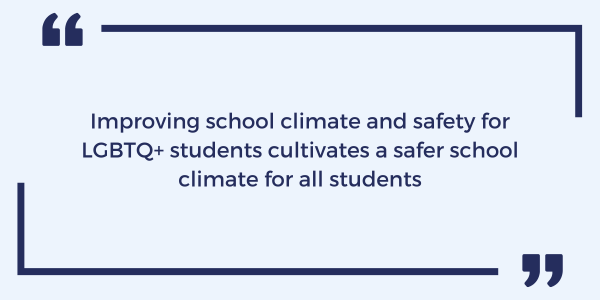By Eishika Ahmed

During the past year, numerous school districts have passed or attempted to pass parental notification policies that mandate teachers and other school professionals to tell parents if their children request to use a different name or different pronouns in school. These policies have resulted in backlash from both advocates in the LGBTQ community as well as students and parents who don’t believe that they’re are good for kids.
The Chino Valley School District became the first district in California to adopt a parental notification policy, requiring school staff to notify parents within three days of noticing their child going by a name or pronouns different from those assigned to them at birth. The district’s policy even extends to observing which bathrooms students are using and notifying parents accordingly if a student uses a bathroom different from their assigned gender. In addition to the Chino Valley School District, several districts in California and around the country have introduced similar policies.
In February of this year, for example, a judge ruled in favor of a group of students, parents, and teachers in a lawsuit filed against the Temecula Valley School District over two policies: one prohibits the teaching of any elements of critical race theory, and the other requires teachers to notify parents if students request to use pronouns or names that are different from those they were assigned at birth. Elsewhere in California, the Orange Unified School District passed a policy very similar to Chino Valley.
Speakers on both sides of the issue have raised depression and suicide prevention as serious issues to keep in mind– issues on which the transgender community is particularly vulnerable. Defenders of parental notification policies usually argue through the lens of “parental rights” and student safety. On the pro-notification side, a board member of the Orange Unified School District, for instance, cited the higher likelihood of trangender youth suffering from self-harm and suicide as a reason to implement parental notification so that parents can be made aware of the risks their children may be facing and protect them. Critics of parental notification policies use the higher prevalence of self-harm and suicide in the transgender community to argue the opposite i.e., that these policies actually cause more harm than good as outing transgender youth can have dangerous consequences and disrupt family dynamics. Additionally, critics argue that parental notification may create distrust between students and school staff and further isolate them, as students may be less likely to confide in counselors and teachers in fear of being reported.
A Trevor Project survey found that less than 40% of queer youth say that their homes are LGBTQ-affirming, meaning that most queer youth feel they do not have parents and/or guardians that would be accepting of their sexual orientation or gender identity. These findings indicate that parental notification policies would therefore put the majority of LGBTQ+ youth in harm’s way by outing them to potentially unsupportive family members, which can have disastrous consequences. For example, approximately 40% of LGBTQ+ youth experience homelessness, and gay and transgender youth who reported rejection from their parents or guardians were over eight times as likely to have attempted suicide than those who did not.
While parental concern for their children’s mental health is certainly valid and important, there are already policies in place for teachers and counselors to notify parents of any concerning behavior their children might be exhibiting– policies that don’t specifically target LGBTQ youth in their language. Neighboring Orange County and Chino Valley, the Placentia-Yorba Linda Unified School District passed a parental notification policy in October 2023 that didn’t explicitly list any groups of students and instead required staff to report students who pose a “clear and present” danger to themselves or others, a policy that is already enshrined in The California Education Code.
To be clear, all students – and particularly those of marginalized identities – are facing unprecedented challenges with mental health, and it’s important for parents to be a part of the conversation and a part of the solution. However, singling out LGBTQ+ students is not the way to do it. In fact, these policies can do the exact opposite of their stated intention by creating unnecessary rivalries and breaking trust between parents and educators at a time when trust between the two parties must be strongest.

Instead of targeting LGBTQ+ students, schools should maintain existing notification policies and direct resources towards actually supporting students’ wellbeing. High suicide and depression rates are pressing issues, and schools and parents should focus their efforts on collaborating towards a solution. For example, schools can expand policies and protections to improve school climate for LGBTQ+ students, such as properly training school staff and counselors to support LGBTQ+ students and cultivating systems in which school staff and families can work together to protect students. Schools can also hire additional counselors, implement universal mental health screenings, and improve social-emotional learning to ensure that all students have better access to mental health supports. Improving school climate and safety for LGBTQ+ students cultivates a safer school climate for all students – contributing to an environment where students have the protection and social-emotional foundation necessary to learn and grow.
